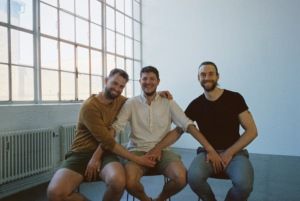News
Killing life at its very source, the horror of testicular cancer
This article is more than 4 years old.
Hands in Your Pants is raising awareness of testicular cancer during the Euro 2020 football championships

Hands-on advice from the team at Hands in Your Pants
It took me two months to go and get checked. That’s too long. I thought: ‘It’s okay, it’s a cyst, it’ll go away,’ and then I woke up one morning and my nut was the size of a lemon.”
Problems down below
Though Stuey Ross was just 23 the first time he was diagnosed with testicular cancer, sadly he’s no outlier.
Denmark has the highest prevalence of testicular cancer in the world per capita. Rare in comparison to other forms, it’s nonetheless the most common type of cancer among young men aged 15 to 35.
Concurrently male fertility levels are falling: a 2018 study by Rigshospitalet in Copenhagen found that of a sample of 6,000 men a mere 20 percent had optimal sperm quality. Cancer and infertility can be avoided – but they need to be acknowledged.
“At the moment in Scandinavia there’s no real network for men who are going through testicular cancer,” explained Stuey who, now 38, has had it twice.
“I had it again when I was 34 … I was just one of the unlucky ones.”
That’s why he teamed up with friends Nicholas Scotland and Thomas Jørgensen to create Hands in Your Pants – the only NGO for testicular cancer in Denmark. Together they’ve set up a myriad of initiatives to raise awareness for the early symptoms and to support men through diagnoses and treatment.
On a mission
“Just being able to talk about what I was going through was really powerful and healing for me. That’s why we wanted to start it,” continued Stuey, who knows first-hand how alone cancer can make men feel.
“There’s a real hole in the market for that. I’m not saying the Danish Cancer Society isn’t doing a good job, but their umbrella is just so big – if you go to one of those sessions it’s all kinds of cancers and only for people under 30.”
Hands in Your Pants runs meet-ups at Amager-based brewery People Like Us that all men are welcome at, regardless of age.
“We’re also planning retreats, group sessions and care packages for men who are currently going through testicular cancer, chemotherapy and radiotherapy, and further down the line we’d like our donations to help fund research,” added Stuey.
“Cancer is just so morbid – there’s so much darkness, and if we can create some kind of light, it can really lift people’s spirits.”
The ‘good’ cancer?
Doctors often refer to testicular cancer as ‘the good cancer’ as survival rates are so high. Though it may comfort some, for many it can invalidate the emotional trauma of cancer treatment.
“That term needs to change. You’re on the chemotherapy table, going through your third chemo, throwing up, losing your hair and constipated – and you can’t get an erection … and you’re like: there’s nothing ‘good’ about this,” contended Stuey.
Cancer treatment may be one section of Danish healthcare where the system is too efficient for its own good.
“In the Danish healthcare system it seems like everything is pretty rushed,” reflected Stuey.
“You come in for surgery on a Tuesday – you’re out of there on Wednesday because that bed needs to be someone else’s on Wednesday afternoon.”
“But the actual medical care I experienced was pretty amazing. The follow-up stuff here in Denmark has been top notch,” he said.
“I’ve been cancer-free for four years, and I’m still going in for check-ups – five years of aftercare is standard.”
Balls, beers, Barracudas
The social-emotional support missing from the Danish healthcare system is where Hands in Your Pants steps in with sessions to equip people with the skills to cope.
“I’ve got a fair bit of experience and enough knowledge and expertise now to really help others,” enthused Stuey.
“People are going to go through cancer and – though they claim to be – they’re not going to be fine. It can be really difficult for the support networks as well: girlfriends, parents, great mates.”
Recent campaigns have included The Biggest Nut Walk. “That was back in April – we tried to walk the biggest testicles-shaped route in the world around Copenhagen,” recalled Stuey.
There’s also a beer in the works – a collaboration with People Like Us and merch-group Mandsholdet – the launch of which will coincide with Euro 2020.
“It gives us an opportunity to sell the beers near the official fan villages and talk to blokes about their nuts. What do men love to do? They love to watch football and drink beer,” joked Stuey.
In a similar vein, on September 4 there’ll be an all-stars Aussie rules match: Hands in Your Pants vs the Copenhagen Barracudas at their home ground at Valbyparken: “We did something similar last year – it’s just a great opportunity to raise awareness on a really fun day in September.”
Get involved
Anyone who wants to get behind the cause can go to @handsinyourpants00 on Instagram and check out upcoming events, or donate via the website handsinyourpants.com
“If you donate to Hands in Your Pants, you’re helping to raise money for awareness campaigns to help us grow, create care packages for men who have been recently diagnosed, retreats, workshops and work groups,” said Stuey.
“And then at some point we’ll create boxer shorts … that aren’t too tight. So fertility levels go back up,” he added with a grin.
Ultimately, Stuey, Nicholas and Thomas’ mission objective is to open up the conversation surrounding testicular cancer. It may be intimidating but it doesn’t have to be lonely.
“If you do find something, go and get it checked, because you’re going to be okay, and we’re going to be here to help you through it.”










































